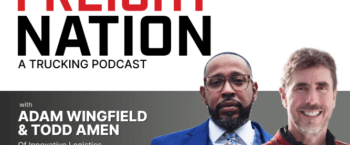6 Ways to Get More Owner-Operator Trucking Contracts

Find your next load
Make more money starting now.
Trucking involves more than just obtaining your operating authority, loading and unloading cargo, and driving from origin to destination. Before you begin, you and the shipper (or broker) must agree on a contract that outlines the job requirements, rate, and transportation timeline.
If you’re wondering how to get trucking contracts, you’re in the right place — we outline different types of hauling contracts, what to consider when reviewing them, and how to find the best trucking loads.
The most common types of trucking contracts
As a truck driver who has established themselves as an owner-operator, learning how to get trucking contracts is important for securing steady work. And you have several options for finding and securing trucking contracts to build your business.
You can work with freight brokers, who act as intermediaries and negotiate on behalf of both carriers and shippers. Or you can pursue government contracts which may also include emergency freight. However, the two most common types of trucking contracts are dedicated contracts and rate confirmation contracts.
1. Dedicated contracts
A dedicated contract obligates a shipper to hire you for specific loads. For instance, if you transport construction materials to builders, a dedicated contract means the shipper will come to you first for jobs involving hauling lumber, bricks, and other construction materials.
Dedicated contracts mean reliable work and steady pay. But landing them requires good relationships with shippers or brokers and specific hauling experience.
2. Rate confirmation contracts
Rate confirmation contracts are for one-time hauls. These specify what a freight broker or shipper will pay you for that particular job and any requirements related to the cargo you’re hauling. There’s no obligation to partner on any future jobs.
The rate confirmation contract is a good place to start. It gets you on the road, moving freight, and helps you build a good reputation as a quality truck driver.
How to get trucking contracts that are right for your business
Whether you’re a seasoned veteran or just starting your trucking company, knowing how to get trucking contracts and understanding the details is crucial. Before you sign anything, consider the following factors.
Costs
Costs can include fuel prices, maintenance and repairs, and vehicle depreciation. You also need to consider travel expenses (meals and lodging). Before accepting any contract, calculate your anticipated costs per mile and understand your cash flow to determine whether the contract is profitable for you.
Payment
Aside from settling on a fair rate, you also need to find out how fast you’ll be paid, whether there are any bonuses, and how you’ll get your money (cash, check, or electronic transfer). You may also want to consider freight factoring for fast, reliable pay.
Location
You might be offered a contract that pays a lot of money. But if it keeps you on the road longer than you’d like or takes you to a lane that isn’t in your geographic wheelhouse, it might not be worth your while. Before accepting a contract, know how far you’re willing to travel, if you need to plan for backhauls, and any state regulations that may impact your journey.
Predictability
Predictability determines whether the shipper or broker can offer you consistent work. Do they need regular transport? Do they have the cargo available for your specific type of business and truck type? Be sure to consider what your business goals are and how you prefer to operate before signing an agreement. While one-off jobs are okay when starting, your ultimate goal is to find clients who can provide ongoing and frequent jobs.
6 ways to get trucking contracts
Now that you know what to look for in a contract, it’s time to find one. To secure quality loads, it’s good to know what kind of client you want to work with ahead of time. Think about whether you want government contracts, seasonal hauling jobs, or even long-term exclusive contracts with a regional shipper.
Here’s how to get contracts for your trucking business.
1. Use load boards
Load boards are a great way to find available contracts. New owner-operators can use load boards to connect with potential clients and secure their first contracts.
Quality load boards are one of your most important tools, especially when you’re starting out, because they give you access to trusted brokers and shippers. Additionally, load boards are great for independent contractors interested in multi-trip searches and higher load volumes.
2. Build a relationship with freight brokers
One of the best ways to get more contracts is to build a network with freight brokers. Freight brokers act as middlemen between truckers and shippers, negotiating on behalf of each party. Establishing long-term relationships with freight brokers can be particularly beneficial, as they often handle profitable contracts, such as FEMA loads.
The larger your network, the more contract referrals you’re likely to get. One good way to build a network with brokers and shippers is to use tools like Book It Now from Truckstop.
Book It Now lets you find loads with trusted brokers in your network and book them quickly. This feature also provides a wealth of upfront information, including rates, load details, origins, and destinations.
3. Hire a dispatcher
Dispatchers can also be great partners when it comes to finding contract trucking jobs. That’s because dispatchers are in an excellent position to connect you with shippers or brokers who need your services. They might either manage your schedule or get in touch if they receive a request for truck loads.
You can either hire your own dispatcher if multiple trucks are under your authority or use a dispatching service. Many dispatchers also offer administrative help. They not only coordinate the movement of trucks and loads, but they also manage paperwork and maintain records.
4. Partner with government transport contractors.
The United States government ships a lot of cargo, making government contracts a great option for providing steady work. From transporting military equipment and supplies to hauling goods for federal agencies, the demand for efficient transportation services is huge.
Many government agencies outsource their shipping to independent truck drivers. State and municipal governments also need help moving cargo.
You can take advantage of this demand by joining forces with a company or broker that handles government freight. Or you could find a government transportation contract as an independent driver by registering as a contractor on various vendor websites, such as sam.gov.
Securing these contracts can provide trucking companies and independent drivers with a consistent flow of work, offering stability and predictability in an industry known for its fluctuations.
However, it’s crucial to carefully review each contract’s terms and conditions, as they often involve specific requirements for equipment, safety standards, and reporting protocols.
5. Prospect and contact local shippers
Often, you can find loads by contacting shippers or freight companies directly.
Closely monitor government solicitations, attend industry events, and use your network to stay informed about potential contracts. When an opportunity comes along, spend some time on your proposal to increase your chances of winning a contract.
Here are some ways you can find relevant shippers to contact.
- Identify potential shippers in your area by researching companies that manufacture, distribute, or sell goods that require trucking services.
- Attend local business events, trade shows, or networking meetings to connect with representatives from companies that may need transportation services.
- Check online directories, chamber of commerce listings, or local business journals to find contact information for shipping/receiving departments or logistics managers.
- Develop a professional marketing package, including your services, equipment, safety record, and competitive rates, to present to prospective shippers.
- Make direct contact through calls, emails, or in-person visits to introduce yourself and inquire about their transportation needs and contract opportunities.
- Ask for referrals from other companies you’ve worked with to get introduced to new shippers.
- Follow up persistently but professionally, as it may take multiple touchpoints to secure a contract with a new shipper.
6. Join industry groups and associations.
Looking for another good way to build your network and get contracts? Connect with other industry folks.
- Join trucking associations. Check out the American Trucking Associations, Owner-Operator Independent Drivers Association, or National Association of Independent Truckers. These groups can be a good source of referrals from other drivers or potential contracts from shippers or brokers.
- Become a member of industry groups that your clients and prospective clients belong to. This can put you in direct touch with companies that require your services and equipment.
Becoming an association member helps you improve your visibility within the industry, which can lead to more contracts.
Contracts can be a game changer for your business and your wallet. By understanding how to get trucking contracts and carefully selecting the right ones, you can build a successful trucking business and secure steady, profitable work.
Find, compare, and book high-paying loads
Start landing freight contracts through a quality load board. The Truckstop Load Board delivers critical information to help you find and make decisions about trusted brokers and their available loads with features including:
- Real-time job opportunities
- Load searching
- Rate estimates
- Decision tools
- Load comparisons
- Multi-trip planning
- Load alert notifications
The Truckstop Load Board also helps you build quality relationships that can lead to consistent work and more contracts. For more information about the Truckstop Load Board, contact us to get a demo today.

Find out how our platform gives you the visibility you need to get more done.
Get helpful content delivered to your inbox.
Schedule a demo.
Find out how our platform gives you the visibility you need to get more done.





